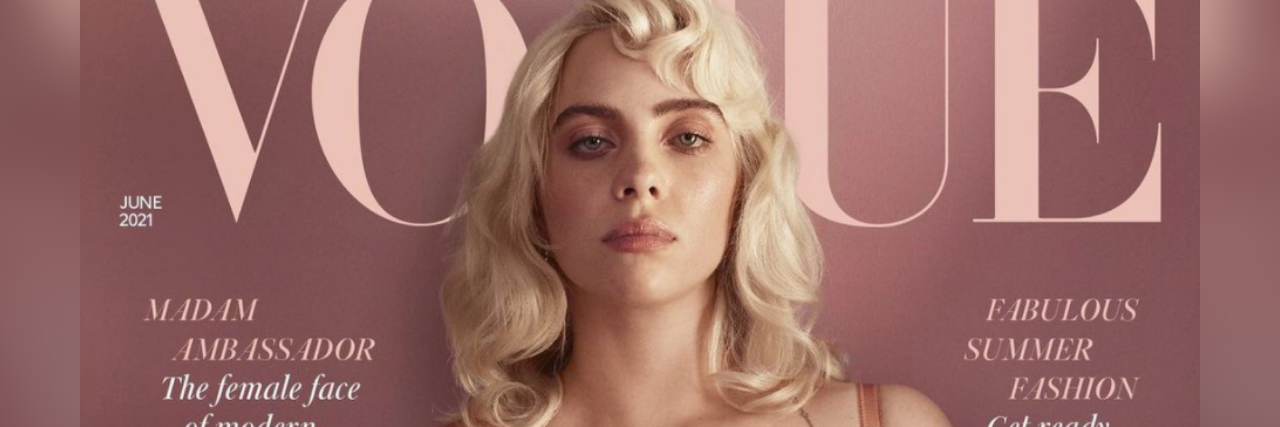For Billie Eilish, Owning Her Body Is Taking Back Her Power
Billie Eilish is once again taking the world by a storm with her second album and the provocative new look she presented in the latest edition of British Vogue. The 19-year-old, once hailed as an icon for being the anti-pop artist — shunning the stereotypical body-baring outfits common amongst female pop stars — anticipated she’d face criticism and backlash for ditching her baggy clothes and donning a corset. She was right. Some are accusing her of selling out and rejecting her values by adopting a more risqué image.
In the article, she is clear about how she has struggled with her body image ever since quitting dance as a young teenager. Her decision to hide her body was perceived as a statement against misogyny, but was more a product of her figuring out who she was and what made her feel comfortable in her own skin. She also alludes to having been taken advantage of sexually by someone in the music industry and feeling the need to reclaim her body for herself. She states: “It’s about taking that power back, showing it off and not taking advantage with it… I’m not letting myself be owned anymore.”
Aside from the fact that she began her career as a child and is now an adult who can make her own decisions in life, the presence of trauma in Eilish’s past is an important factor in her style evolution. As a fellow survivor of sexual assault and an ex-dancer, I can’t help but identify with the desire to take back ownership of one’s body. Women in general are objectified at every turn. Our value seems to hinge on our looks and it becomes virtually impossible to escape photoshopped images of “ideal” female bodies. But when you factor in trauma, there’s an extra level of oppression that takes on a life of its own.
Sexual assault or abuse can make you feel unsafe in your own body. I know for myself there was this distinct sense that my maturing body somehow invited the violation, and so I compensated by covering it up in an attempt at keeping future abusers away from me. I didn’t trust my body so I felt the need to hide it to protect it. Baggy clothes were like a shield of armor to me, neutralizing my femininity and thereby rendering me less desirable. It never occurred to me that sexual violence was about control, not sex or my body, but it’s a common natural conclusion.
When it comes to being a dancer, your body is quite literally on display. It is the medium for your expression and it requires a tremendous amount of discipline and hard work. I never had the “right body” for dance. I was always too short, too busty and too “big boned.” No matter how hard I worked or how talented I was, I’d never look right. I ended up developing anorexia and body dysmorphia as a result of the constant criticism. Eventually I quit dancing and had to accept that my body had curves. I imagine leaving dance while accepting her own maturing body had to be incredibly disconcerting for Eilish. She alludes to hating her stomach and feeling like she needs to hide it. For me it was my breasts. This constant hyperfixation on parts of our body that we dislike directly influences what we choose to wear. To this day, looking in the mirror is like being in the fun house at a carnival. I never know which mirror I’m going to get on any given day, and if it’s “one of those days” it most definitely influences how much I want to cover up.
As I have begun to heal my trauma, I have made a concerted effort to reclaim my own body. I too have experimented with my look, including taking boudoir photos and even nude photos. The point of doing so had nothing to do with being sexual or promiscuous. It had everything to do with understanding my body as a source of power, worth and belonging rather than a vessel of pain, anger and punishment.
Billie Eilish talks candidly about spending time during the pandemic working on not just her music, but on her well-being… on “feeling good.” She’s made a concerted effort to establish stronger boundaries with what she shares publicly and how she chooses to present herself. Her desire to be heard and to spread her message is clear. Women’s bodies do not exist for anyone’s exploitation or commentary, regardless of how they are dressed. And every female has a right to determine how they wish to express their individuality regardless of what society expects of them.

